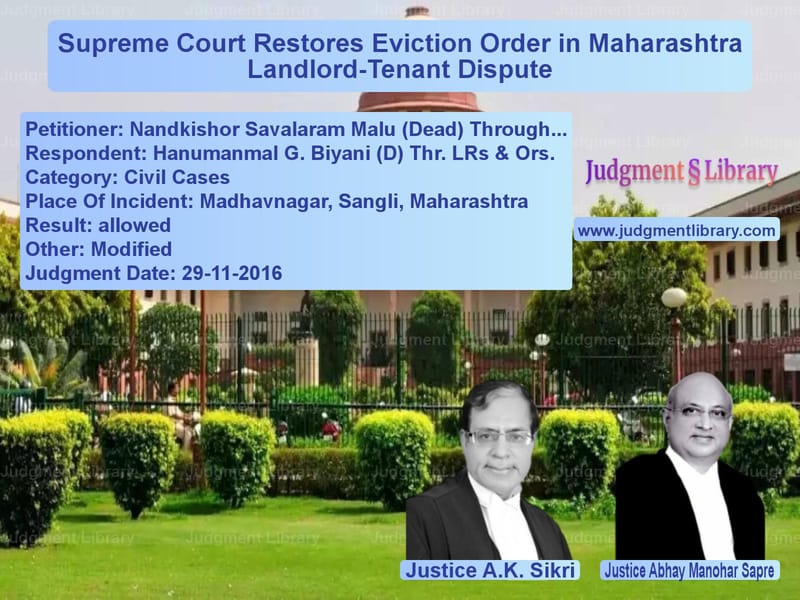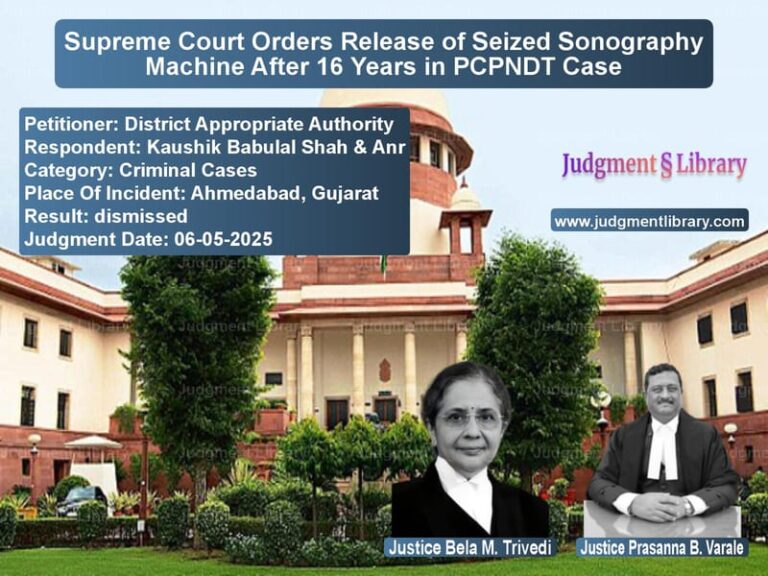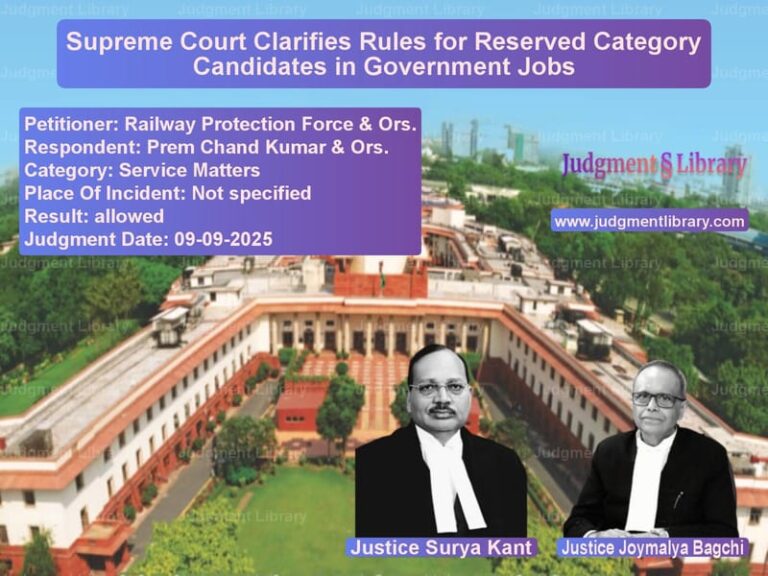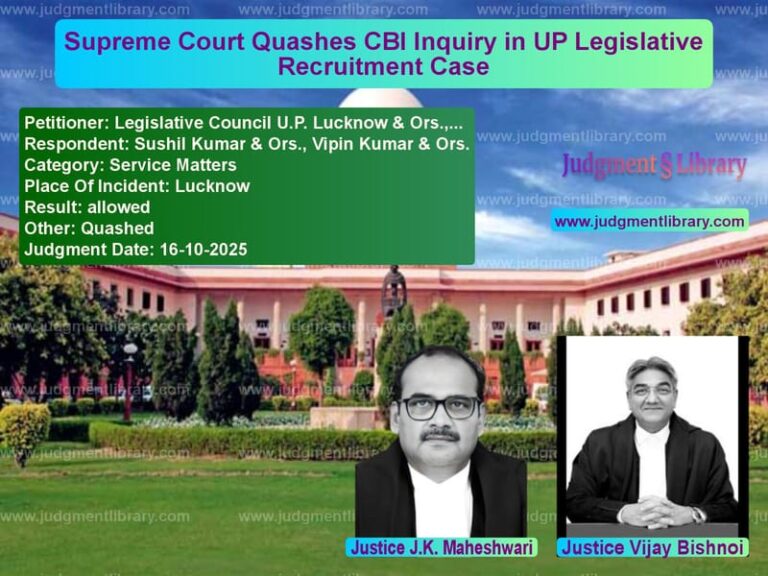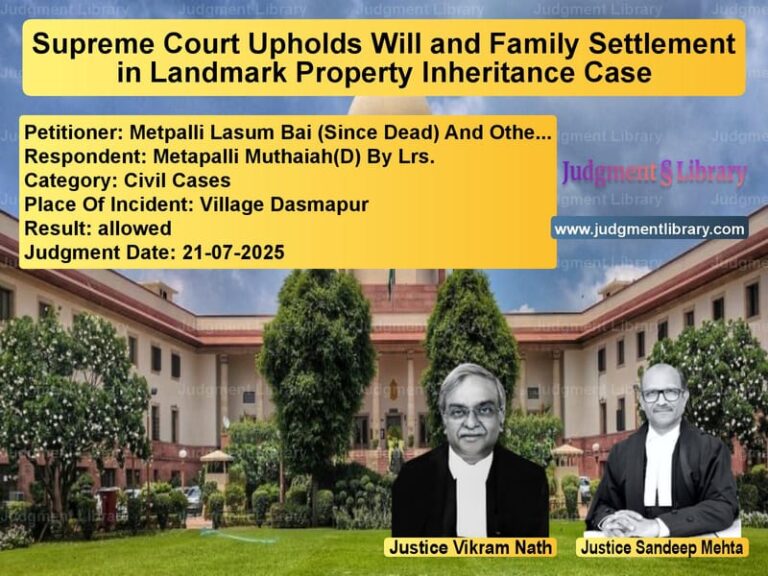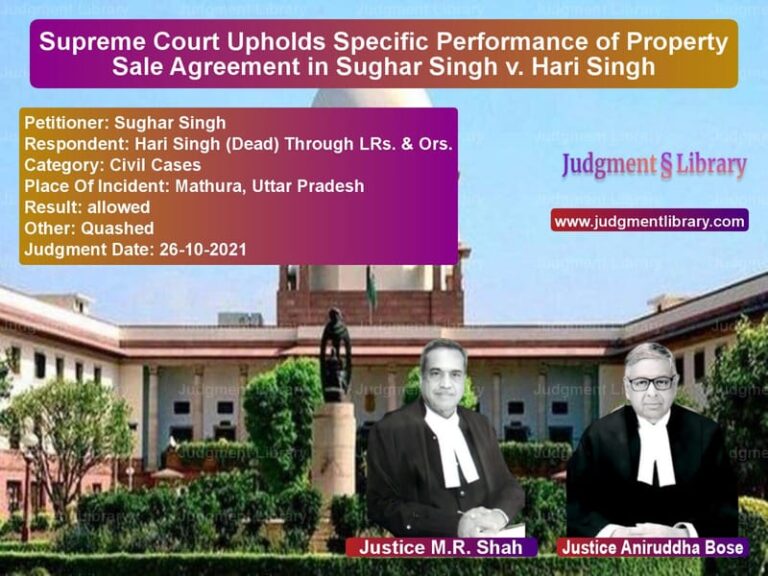Supreme Court Restores Eviction Order in Maharashtra Landlord-Tenant Dispute
The Supreme Court of India recently ruled in Nandkishor Savalaram Malu (Dead) Through LRs vs. Hanumanmal G. Biyani (D) Thr. LRs & Ors., addressing a long-standing landlord-tenant dispute regarding the eviction of a tenant from a rented property in Madhavnagar, Sangli, Maharashtra. The case revolved around the tenant’s refusal to vacate the premises despite non-payment of rent, leading to an extensive legal battle.
Background of the Case
The case arose when the landlords, Sawalaram Shriram Malu and his son Nandkishore Sawalaram Malu, jointly owned House No. 47/48 in Madhavnagar, Sangli. The property was rented to a textile firm, M/s Biyani Textile, at a monthly rent of Rs. 260.
On March 9, 1982, the landlords issued a quit notice to the tenant, demanding rent arrears for the period from June 1, 1980, to February 28, 1982, and seeking possession of the property. Since the firm did not clear the arrears or vacate the premises, the landlords filed Regular Civil Suit No. 317 of 1982 under the Bombay Rent Control Act for eviction.
Arguments by the Appellants (Landlords)
- The firm defaulted on rent payments and failed to clear arrears despite multiple notices.
- The tenant firm had no legal right to continue occupying the premises.
- Defendant No.1 (an employee of the firm) was in illegal possession of the property and had no tenancy rights.
Arguments by the Respondents (Tenant and Partners of the Firm)
- The tenant claimed that in 1980, the firm had already vacated the premises and the landlords had let it to Defendant No.1.
- The tenant argued that the suit should be dismissed as the necessary parties were not impleaded.
- Defendant No.1 claimed he had become the direct tenant of the landlords.
Trial Court’s Judgment
The Trial Court delivered a split ruling on October 14, 1991:
- The eviction suit was dismissed against Defendant No.1, recognizing him as a separate occupant.
- The suit was decreed against Defendant Nos. 2 to 9 (partners of the firm), ordering their eviction.
- The Court ruled that Defendant No.1 could not be evicted under the Bombay Rent Control Act but left the matter to a separate civil suit.
First Appellate Court’s Judgment
On appeal, the District Judge reversed the Trial Court’s ruling and decreed the suit against all defendants, stating:
- Defendant No.1 was still an employee of the firm and could not claim independent tenancy.
- The tenant firm had defaulted on rent and must be evicted.
- All defendants were liable to pay mesne profits of Rs. 260 per month from May 1, 1980, till possession was handed over.
High Court’s Judgment
The defendants challenged the First Appellate Court’s ruling before the Bombay High Court, which allowed the revision application and restored the Trial Court’s ruling. The High Court agreed that Defendant No.1 was not a party to the original tenancy agreement and could not be evicted through rent control proceedings.
Supreme Court’s Judgment
A two-judge bench, comprising Justice A.K. Sikri and Justice Abhay Manohar Sapre, reviewed the case and ruled in favor of the landlords.
The Supreme Court ruled:
“The legal effect of an eviction decree under the Rent Act was that the possession of the tenant firm and persons claiming through such tenant became unauthorized.”
The Court further clarified:
- Since the tenant was a firm, all persons connected with it, including its partners and employees, were bound by the eviction decree.
- Defendant No.1 was not an independent tenant but an employee of the firm and had no separate tenancy agreement.
- There was no need for the landlords to file a separate suit against Defendant No.1, as the eviction decree covered all parties claiming under the tenant.
Accordingly, the Supreme Court:
- Set aside the High Court’s ruling.
- Restored the First Appellate Court’s decision, directing eviction of all defendants.
- Ordered the respondents to pay rent arrears and hand over possession within three months.
Key Takeaways from the Judgment
- Tenant’s Employees Have No Independent Tenancy Rights: An employee occupying a rented premises through a tenant cannot claim separate tenancy.
- Eviction Decrees Apply to All Claiming Through a Tenant: If a firm is evicted, all individuals claiming through it must vacate.
- Supreme Court Can Reverse High Court Rulings: The Court’s decision highlights its power to correct errors made in lower courts.
Impact of the Judgment
- Protects Landlords’ Rights: The ruling ensures that tenants cannot subvert eviction proceedings by introducing new occupants.
- Provides Legal Clarity: This case serves as a precedent for cases involving disputed tenancy claims.
- Ensures Efficient Judicial Process: The ruling discourages unnecessary delays in eviction cases.
Conclusion
The Supreme Court’s ruling in Nandkishor Savalaram Malu vs. Hanumanmal G. Biyani is a significant decision that reinforces landlords’ rights to evict defaulting tenants and those claiming under them. By overturning the High Court’s ruling, the Court upheld the integrity of eviction laws and ensured justice for property owners.
Don’t miss out on the full details! Download the complete judgment in PDF format below and gain valuable insights instantly!
Download Judgment: Nandkishor Savalaram vs Hanumanmal G. Biyani Supreme Court of India Judgment Dated 29-11-2016.pdf
Direct Downlaod Judgment: Direct downlaod this Judgment
See all petitions in Landlord-Tenant Disputes
See all petitions in Damages and Compensation
See all petitions in Property Disputes
See all petitions in Judgment by A.K. Sikri
See all petitions in Judgment by Abhay Manohar Sapre
See all petitions in allowed
See all petitions in Modified
See all petitions in supreme court of India judgments November 2016
See all petitions in 2016 judgments
See all posts in Civil Cases Category
See all allowed petitions in Civil Cases Category
See all Dismissed petitions in Civil Cases Category
See all partially allowed petitions in Civil Cases Category

